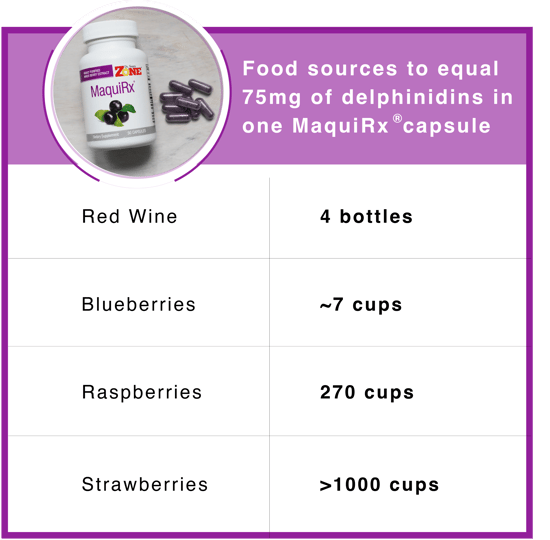Polyphenols are the chemicals that give vegetables and fruits their colors. They also represent the plant’s primary defense against invading bacteria and other parasites. Their intake is essential for gut health as they control the bacterial composition of our digestive system.
There are about 8,000 known polyphenols from various sources, but Dr. Sears considers those from the blueberry family the best. The polyphenols in the blueberry family include American blueberries, Russian blueberries (bilberries), and Patagonia blueberries (maqui berries). Maqui berries have the highest concentration of a subclass of polyphenols called delphinidins. What makes delphinidins superior to other polyphenols is they are water-soluble and can be isolated as monomers which means they are more likely to get into the blood. In clinical studies delphinidins have been shown to help improve blood sugar control and reduce oxidative stress.
The Health Benefits of Polyphenols
It is becoming recognized that polyphenols are essential nutrients for human health. They are potent antioxidants, have anti-inflammatory effects, and help activate AMPK, the master regulator of your metabolism. The more you can activate AMPK, the more you increase energy production, activate your immune function, and help repair damaged tissue. Equally important, you need adequate levels of polyphenols to maintain the appropriate balance of bacteria in your gut, which is critical to maintaining long-term health. If that balance is disturbed by a lack of polyphenols in your diet, the result will be increased cellular inflammation throughout your body.
The Amount of Polyphenols You Need
Ideally you should consume 5-10 servings of fruits and vegetables daily to have adequate intake of polyphenols. This equates to about 1000mg of total polyphenols. All polyphenols are excellent for the gut, but getting the proper amounts into the blood is quite difficult since very few are water-soluble making it difficult for them to be absorbed. Of the 8,000 known polyphenols, very few can be directly absorbed. The exceptions are maqui berry and cacao polyphenols. Your body can readily absorb more than 95 percent of purified maqui berry polyphenols and approximately 10-15 percent of isolated cacao polyphenols. Many clinical studies showing the benefits of polyphenol supplementation have used either maqui or cacao polyphenols.
How Do You Know If You Are Getting Enough?
There is no specific test to measure polyphenols in the blood since their lifetime in the body is short. That said, you can take a standard test to determine whether you are taking enough to activate AMPK. This test is called hemoglobin A1c (HbA1c). HbA1c is a measure of the average circulating levels of glucose over a 3-month period of time. If you can maintain a HbA1c level between 4.9-5.1 percent, you are probably doing a good job getting enough polyphenols through diet and supplementation. If your HbA1c levels are higher, you may need to add more polyphenols to your diet.
Why are Delphinidins "the Best of the Best"?
Delphinidins have a unique structure compared to all other polyphenols that allow them to activate AMPK, giving them unique anti-inflammatory and anti-aging benefits. The richest source of delphinidins is the maqui berry, found only in the Patagonian region of Chile. The maqui berry has 14 times more delphinidins than blueberries whereas strawberries and raspberries have little to no delphinidins. The health benefits of maqui berry concentrate, rich in delphinidins, have been shown to help activate AMPK, the master switch that controls your metabolism. The increased activity of AMPK has been shown to help with appetite control, blood sugar support, lipid levels, reduction of inflammation, and the repair of damaged tissue. I consider delphinidins to be the “best of the best” in polyphenols to improve your metabolism. As part of your total polyphenol intake, I recommend aiming for about 75-100mg of delphinidins daily. Even a diet rich in fruits and vegetables will not contain those levels of delphinidins.
Can You Get Enough Maqui in Fresh Berries, Freeze-Dried Powders or Juice?
Polyphenol extracts significantly increase the levels of polyphenols and reduce their carbohydrate content. Extracts are more concentrated and purified than simply drinking fruit juice or consuming a dry powder made from fruit juice. With extracts, the dry powder is further processed to increase the polyphenol content significantly. For most purified extracts (such as MaquiRx), the final concentration step involves a complex purification process that produces a refined extract with about 40 percent of polyphenols by dry weight.
Why MaquiRx®?
MaquiRx® is composed of monomers of delphinidins, which can enter the blood more readily than other polyphenols, thus supporting the activation of AMPK. One capsule of MaquiRx has the same amount of delphinidins found in 48 glasses of red wine, 7 cups of blueberries, and 272 cups of raspberries.







Let Us Know What You Thought about this Post.
Put your Comment Below.